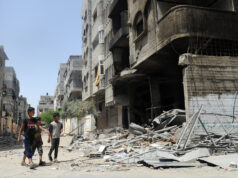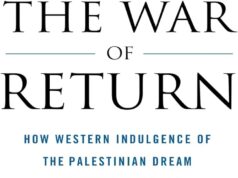On June 28 and 29, 2011, the UN Committee on the Exercise of the Inalienable Rights of the Palestinian People (CEIRPP) sponsored an “International Meeting in Support of the Israeli-Palestinian Peace Process” in Brussels. Attended by European and Arab officials, along with dozens of representatives from non-governmental organizations (NGOs), the ostensible purpose of the event was “aimed at contributing to international efforts at achieving peace between Israelis and Palestinians by looking at the role of Europe in advancing a two-State solution.”
However, instead of supporting the peace process, the meeting’s actual objective was to “look at alternatives to the negotiating process.” And more specifically, it was aimed at galvanizing European diplomatic endorsement for the Palestinian intention to unilaterally declare a state at the September 2011 UN General Assembly session.
This event under the auspices of the CEIRPP is one of many such UN activities that promote Palestinian political initiatives targeting Israel. For decades, the Palestinians, backed by the Arab League and the institutionally powerful Organization of the Islamic Conference (OIC), have exploited the UN and other international institutions to avoid the compromises necessary for a peaceful resolution to the conflict. These core issues include refugee claims, the complex status of Jerusalem, and recognizing the Jewish right to national sovereignty. For instance, in 1988, the PLO followed a unilateral path, declaring a “State of Palestine” and securing a General Assembly resolution supporting the move.
Indeed, Palestinian Authority (PA) President Mahmoud Abbas admitted in his May 17, 2011, New York Times op-ed that Palestinian statehood would not be used to peacefully end the conflict, but rather:
Palestine’s admission to the United Nations would pave the way for the internationalization of the conflict as a legal matter, not only a political one. It would also pave the way for us to pursue claims against Israel at the United Nations, human rights treaty bodies and the International Court of Justice.
Thus, the unilateral Palestinian move, and the sequence of events leading up to it, is part of a wider campaign, conducted over decades, that has used the UN to promote numerous political initiatives targeting Israel.
Exploitation of UN Frameworks
In the 1970s, by exploiting Cold War politics and an alliance with the Soviet Union, Palestinians and their supporters launched several efforts at the UN to undermine Israel’s legitimacy. These initiatives included numerous declarations and resolutions adopted by the Security Council and the General Assembly, the establishment of several committees and legal commissions, as well as actions by the UN human rights and treaty bodies. For instance, Palestinians sought to have Zionism codified as a form of “apartheid” in the 1973 International Convention on the Suppression and Punishment of the Crime of Apartheid—a document initiated by the Soviet Union that defined apartheid so broadly as to apply to all Western states. In 1975, the Arab and Islamic blocs gained passage of the infamous 1975 UN General Assembly “Zionism is Racism” declaration. The aforementioned CEIRPP was also created on that day.
With millions of dollars provided annually from UN coffers, CEIRPP promotes the Palestinian version of history through numerous public conferences and “civil society” seminars, and has become a primary vehicle for Israeli demonization. According to a report by the Anti-Defamation League (ADL), the committee is “the single most prolific source of material bearing the official imprimatur of the UN which maligns and debases the Jewish State,” and is “the only committee in the UN devoted to a specific people.”
The 2001 Durban Conference
The anti-Israel agenda at the UN has also been manifest in a number of more general frameworks that, in contrast to the CEIRPP, are not devoted specifically to Palestinian lobbying.
In 2001, the UN Office of the High Commissioner for Human Rights convened the World Conference Against Racism in Durban, South Africa. Taking place against the backdrop of the failed Oslo peace process, the Camp David summit in July 2000, and renewed Palestinian terrorism and suicide bombings in Israeli cities, the Durban Conference marked the intensification of attacks against Israel in the UN and the centrality of non-governmental organizations in that process.
At the NGO Forum of the conference, officials from more than 1,500 NGOs issued a resolution singling out Israel as “a racist, apartheid state” and labeling “Israel’s brand of apartheid as a crime against humanity.” These NGOs accused Israel of the “systematic perpetration of racist crimes including war crimes, acts of genocide and ethnic cleansing” and called upon the “international community to impose a policy of complete and total isolation of Israel as an apartheid state.” As Prof. Irwin Cotler noted, “a conference that was to commemorate the dismantling of apartheid in South Africa turned into a conference that called for the dismantling of Israel as an apartheid state.”
The diplomatic and youth frameworks of the Durban Conference were also characterized by a biased agenda, although not as intense as the NGO Forum. The official U.S. and Israeli delegations walked out of the diplomatic sessions in protest at the language of incitement directed against Israel, and while the Canadian and European officials remained, they protested against the diplomatic forum’s final statement. By then, however, the much larger and more influential NGO Forum had already completed its activities and issued the closing declaration.
International Court of Justice
Following Durban, Palestinians increasingly turned to international legal bodies seeking a judicial imprimatur for their political positions, and to block Israeli defensive measures against terrorism. In June 2002, Israel announced its decision to erect a barrier in order to prevent terrorists from entering Israel. The decision was made in response to suicide bombings targeting restaurants, cafes, buses, and shopping malls that killed hundreds of Israelis, including scores of children, and wounded thousands. Shortly after construction began on the barrier, Palestinian officials, aided by NGOs such as Human Rights Watch (HRW) and B’Tselem, issued demands for the barrier’s dismantling, accusing Israel of international crimes and human rights violations. In December 2003, Palestinians successfully lobbied for a UN General Assembly referral for an advisory opinion from the International Court of Justice (ICJ) on the legality of the barrier.
The language of the ICJ request made clear that the outcome of the case was pre-determined. On July 9, 2004, the ICJ issued its advisory opinion supporting the Palestinian position, although the minority presented a stinging dissent criticizing the biases in the majority opinion. Several years after the court’s opinion, Palestinians, with assistance from the same NGOs that lobbied for the case, continue to publicize the decision (often misleadingly portraying it as a binding “ruling” as opposed to an advisory opinion without legal obligation) and have used it to promote boycott, divestment, and sanctions (BDS) against Israel, as well as to file “war crimes” lawsuits against Israeli officials and against companies and governments that do business with Israel.
Palestinian officials have also called for advisory judicial opinions on the legality of the Gaza War of 2008-09 and whether “the policies and practices of Israel within the Occupied Palestinian Territories violate the norms prohibiting apartheid and colonialism.”
International Criminal Court
The Palestinian lobby also maneuvered within the International Criminal Court (ICC) in The Hague, Netherlands. The ICC was established in the late 1990s as a court of last resort to punish the very worst cases of mass murder and torture. Israel was a strong backer of the ICC until it was co-opted by Arab and Islamic regimes, which succeeded in changing the Court’s statute to eliminate terrorism as an offense and, at the same time, to define Israeli settlement activity as an international crime. Israel then withdrew as a party to the Court and currently as a result, its officials cannot be prosecuted there.
Nevertheless, following the Gaza War the Palestinian Authority lodged a declaration purporting to make it, too, a party to the Court so that Israelis could be prosecuted for alleged crimes committed in “Palestine.” Instead of summarily rejecting the request as the ICC rules demand—there is no state of Palestine—the ICC prosecutor chose to conduct a highly unusual public campaign on the PA’s behalf. HRW, Amnesty, and several other NGOs have, in turn, strongly backed this campaign. While the prosecutor has hesitated to rule in the PA’s favor due to political considerations, there is no doubt that a UN declaration of statehood would erase those obstacles and lead him to open an investigation. The Palestinians would therefore achieve a significant PR victory—even if the investigation was eventually closed and no Israeli ever stood trial.
Human Rights Bodies
The UN’s human rights frameworks, primarily the Human Rights Council (HRC) and its predecessor, the Commission on Human Rights, as well as the UN human rights treaty bodies, have been the sites of further Palestinian campaigning. Due to the influence of the Islamic bloc and allied countries which comprise nearly two-thirds of the HRC membership, the Palestinians have been able to harness that influence to push a disproportionate and obsessive focus on Israel. Israel is the only country with its own permanent agenda item at the HRC, it has been the focus of more than 80 percent of the resolutions issued by the HRC, and half of the special sessions have been devoted to condemnations of the Jewish state. Since 2006, the HRC has appointed at least five “fact finding” committees, most notably the Goldstone Mission, to investigate alleged Israeli abuses—more than any other country.
Israel is only one of seven countries appointed a Special Rapporteur to monitor human rights violations—the other six are Myanmar, North Korea, Somalia, Sudan, Haiti, Burundi, and Cambodia—and the only country where the Rapporteur’s mandate does not expire. The Special Rapporteur appointed by the HRC is typically an anti-Israel ideologue, like the current mandate holder, Richard Falk. Many of the Thematic Rapporteurs addressing particular issues like the “right to food” also routinely prioritize Israel as the worst violator of these rights, ignoring real suffering around the world.
Similarly, the UN human rights treaty bodies issue dozens of condemnations for alleged Israel abuses of Palestinian rights, even when those alleged violations clearly fall outside the mandate of the treaty. For instance, a 2009 review issued by the Committee Against Torture, the body charged with examining Israel’s compliance with the Convention Against Torture, addressed “settlement policy,” “checkpoints,” the “Fence/Wall,” and the “blockade of Gaza,” even though these items clearly do not fall under the definitions of torture in the Convention.
The Continuation
The ongoing Palestinian political campaigns, backed by the Arab League, the OIC, and significant mobilization from NGOs, will likely increase attacks on Israeli legitimacy in UN frameworks. In parallel, the boycott, divestment, and sanctions (BDS) campaigns and the filing of “war crimes” lawsuits against Israeli officials and business partners are likely to multiply. As detailed above, these strategies have been employed for decades and will continue regardless of the outcome of the Palestinian unilateralism in September. Therefore, even if this tactic is defeated, the anti-Israel campaigning that is conducted in the UN is unlikely to end. Indeed, as long as these campaigns continue, it will interfere with the important efforts to reach a negotiated peace agreement, based on compromise and clearly marking the end of the conflict.
Gerald Steinberg is a professor of Political Science at Bar Ilan University and the President of NGO Monitor. Anne Herzberg is NGO Monitor’s Legal Advisor.






[…] by that basic measure to decline, they are branded “rejectionists.” There is a long history to this designation, which implicates not only scholars like me declining to participate in conferences but […]
[…] by that basic measure to decline, they are branded “rejectionists.” There is a long history to this designation, which implicates not only scholars like me declining to participate in conferences but […]